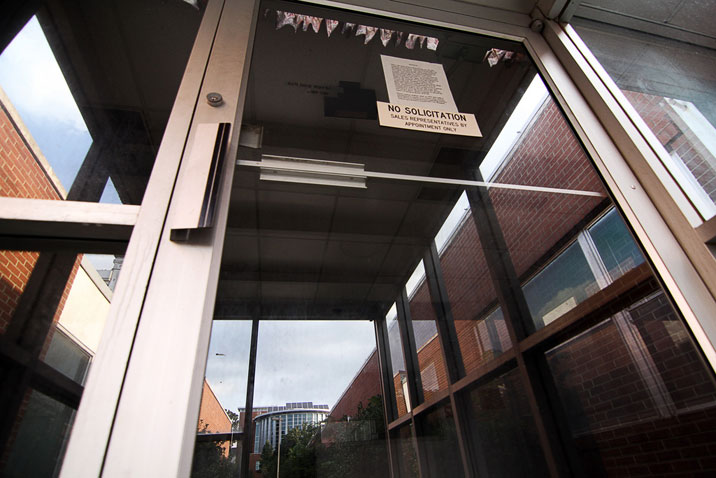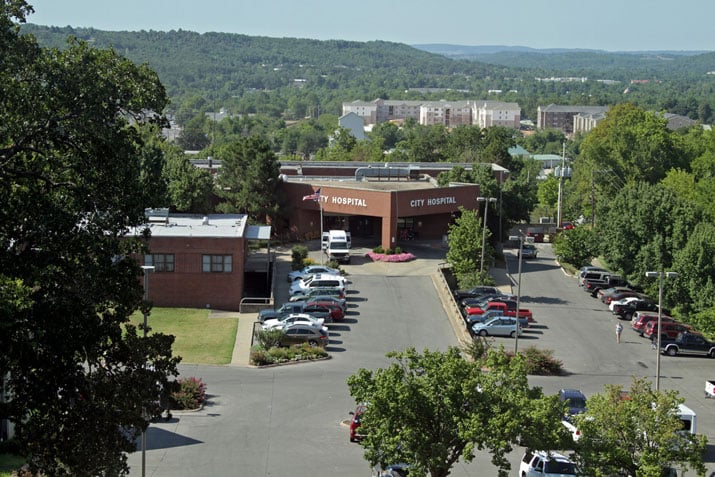
A note announcing the closure of the City Hospital facility was taped to a door at the northern entrance of the building which sits in the shadow of the Fayetteville Public Library across Rock Street.
Photos: Todd Gill, Flyer staff
Those hoping for an expanded public library in downtown Fayetteville can breathe a sigh of relief.
The Washington Regional Medical Center board voted Tuesday to sell the former City Hospital property to the Fayetteville Public Library. If the deal is finalized, officials plan to nearly double the size of the library campus by building an 80,000-square-foot expansion next door to the current facility on Mountain Street.
Library board members last month offered the medical center $2 million for property, but some feared the bid was too low. A recent appraisal valued the land at $3.29 million. On top of that, the library wasn’t the only interested buyer.
Two real estate developers submitted bids, including Specialized Real Estate Group who offered $2.275 million for the land. The Fayetteville-based company is behind the Eco Modern Flats complex and two student housing projects – Sterling Frisco and West Center – which are both under construction in downtown Fayetteville.
Jeremy Hudson, CEO of Specialized, said his company withdrew its bid after learning the library was interested in the property.
“We certainly support the library’s plans,” Hudson said Wednesday. “We didn’t want to stand in the way.”
The only other active bidder also offered $2 million, but Washington Regional officials chose the library’s bid. They also requested that the library expansion be dedicated to the Stone Family, who donated the land to the city in 1909.
History of the land
The Stone’s dedication of the land to the City of Fayetteville included a stipulation that the property be used only for hospital purposes.
The City Hospital was built on the land where it operated for 81 years before transitioning into a nursing home run by Washington Regional in 1993.
As the building began to show its age, the fate of the land became uncertain.
Would Washington Regional continue using the outdated facility or would it eventually be vacated? Would any other hospital entity step forward to lease the aged complex?
Selling the land, according to City Attorney Kit Williams, wasn’t an option unless the city used the proceeds for hospital purposes.
A roundabout way
City Council members decided to trade the deed to Washington Regional in 2011 in exchange for land needed to build a traffic roundabout at Futrall Drive and Northhills Boulevard.
Washington Regional eventually closed the nursing home and announced it would sell the property, which opened the bidding process that led to the upcoming library purchase.
By selling the land back to the city-owned library and using the proceeds to build a planned neuroscience institute, Washington Regional satisfies the Stone Family’s deed requirements and restores public ownership of the property for community use.
It’s unclear whether the complicated transfer to Washington Regional and then back to the city was anyone’s longterm plan, but it certainly created an opportunity for both parties to move forward and expand.
“This is a win-win for everybody,” said library board treasurer Maylon Rice, after a celebratory champagne toast on Wednesday.
Library support

Fayetteville Public Library board president Kim Agee leads a champagne toast to celebrate the medical center’s decision to sell the City Hospital property to the library.
With the Fayetteville Public Library entering the bidding process late in the game, one can only speculate why Washington Regional was so patient with the bids. It’s been reported that the board slowed its bid-taking process to give the library a chance to get organized.
Library executive director David Johnson said the community’s overwhelming support might have swayed medical center officials in their decision.
“We have a lot of supporters out there who love their library and who are vocal about it,” said Johnson. “I do think it had a role to play.”
Library officials reported 62,890 cardholders in July, which is about 85 percent of the most recent U.S. Census Bureau population estimate for Fayetteville.
“Fayetteville is off the charts in terms of its use of materials in proportion to other cities around the region and nationally,” said Jeffrey Scherer, whose Minneapolis-based architecture firm helped design the library’s current campus.
Scherer drafted the space needs assessment used to create the library’s 2030 Master Plan which residents saw earlier this month during two public review sessions.
Looking ahead
Johnson said surveys and public input sessions would play an integral role in the finalized design of the expansion, which calls for more space for special events, a 750-seat multipurpose public auditorium, an expanded children’s area, a new young adults section and public “maker spaces” stocked with 3D printers, video editing software, and music studio equipment.
As for funding, library staff are already in the early stages of a capital campaign for the project.
“We’ve started reaching out to some of our donors and we’ve had some really promising conversations,” Johnson said.
Once the Nov. 12 bond issue is voted on, Johnson said the board would start discussions of a millage increase to secure funds needed to complete the new facility, similar to the temporary sales tax Fayetteville voters approved to help build the current library, which opened in 2004.
Those talks, he said, could include a proposal to add library branches in other parts of the city such as the heavily populated Wedington Corridor west of Interstate 540 or somewhere in north Fayetteville.
During their celebration Wednesday evening, board members praised Johnson for leading the charge to purchase the hospital property, but Johnson said library expansion is only part of his master plan.
“I won’t be satisfied until every single person in this community can find something in their library for them,” he said. “I want 100 percent of this city to have a library card and be proud of it.”



